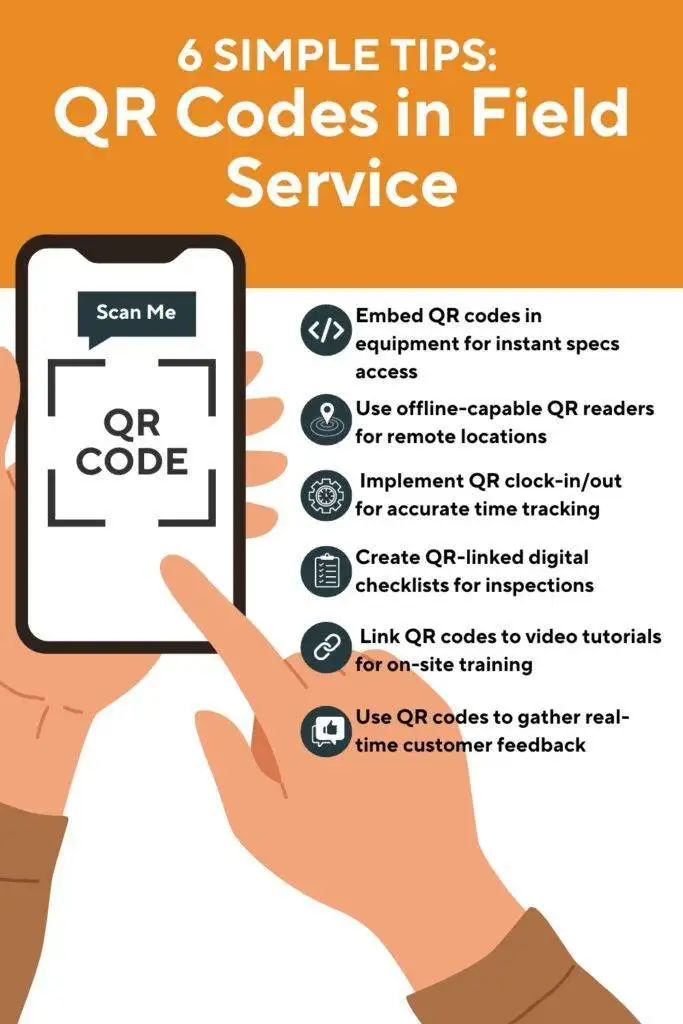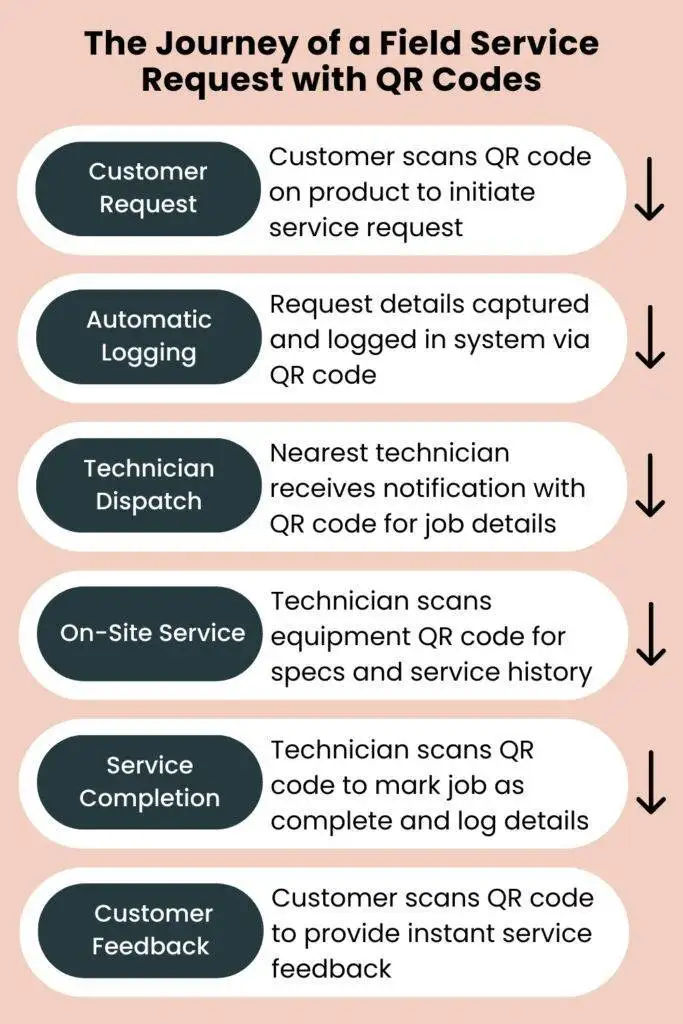How QR Codes Enhance Field Service Operations?
.webp?updatedAt=1747026692358)
Technology is a big part of how field service processes change and become more effective.
Did you know that the global field service management market is expected to reach $5.1 billion by 2025, growing at a CAGR of 16.2% from 2020 to 2025?
In this rapidly growing industry, QR codes are emerging as a game-changing technology. A June 2021 survey revealed that 45% of U.S. shoppers had used a marketing-related QR code in the previous three months. This trend was particularly strong among younger consumers, with the highest usage among respondents aged 18 to 29. Importantly, 59% of respondents believed that QR codes would become a permanent part of mobile phone usage in the future.
These statistics highlight the growing acceptance and integration of QR codes in everyday life, suggesting a bright future for their application in specialized fields like field service operations. As consumers become more comfortable with this technology, its adoption in professional settings is likely to accelerate.
Let’s explore how these simple yet powerful tools are revolutionizing field service operations.
The Rise of QR Codes in Field Service
Technology is a big part of how field service processes change and become more effective. The QR code is one of these technologies that has become very popular. Generating QR codes is becoming increasingly common as they are simple but useful, making numerous tasks easier in the field.
People are increasingly using QR codes in many different fields to:
- Keep track of assets
- Manage work orders
- Access important information quickly
Because they are flexible and easy to use, QR codes are perfect for:
- Improving accuracy in field service
- Enhancing efficiency
- Helping companies stay ahead in a competitive market
Why Do We Need to Generate QR Codes?
Creating QR codes is essential for several reasons:
- Quickly sharing and accessing information
- Streamlining operations
- Enhancing customer experience
They offer numerous benefits:
- Enable instant access to data
- Improve efficiency by reducing manual tasks
- Provide seamless online interactions in marketing and customer service
- Offer secure methods for transactions and authentication
This versatility makes QR codes valuable tools across various industries.
Types of QR Codes
Understanding different types of QR codes helps in choosing the best one for specific needs. QR codes are classified into two main categories:
1. Static QR Codes:
- Information inside stays the same and can’t be changed
- Best for data that doesn’t change, such as:
- Website links
- Contact information
- Plain text
2. Dynamic QR Codes:
-
Information can be changed and updated after creation in dynamic QR code (you can create using the best QR code generator)
-
Useful when encoded data needs to be modified, like:
- Changing URLs
- Updating product information
Eight Ways QR Codes Are Enhancing Field Service Operations
1. Boosting Operational Efficiency
QR codes are changing the way field service teams do their daily work:
-
Employees can quickly access and edit important information
-
Scanning a QR code attached to a device provides:
- Maintenance history
- Current status
- This ensures data accuracy and speeds up tasks like:
- Identifying devices
- Managing work orders
- Checking tasks
Result: Improved operational efficiency, allowing teams to focus on better task execution.
2. Quick Access to Essential Information
QR codes provide instant access to digital tools:
- With a quick scan, experts can access:
- Detailed manuals
- Troubleshooting guides
- Repair directions
-
All information is available on mobile devices
-
Reduces downtime by eliminating the need for:
- Carrying heavy guides
- Waiting for assistance
- Enables immediate problem-solving
Outcome: Faster service and increased customer satisfaction.
3. Reducing Paperwork and Increasing Productivity
Traditional field service operations required:
- Large quantities of paperwork
- Manual data entry prone to errors
QR codes help by:
- Digitizing the entire workflow
- Reducing the need for physical forms
- Decreasing the possibility of errors
- Saving workers valuable time
Benefits:
- Increased productivity
- Lower operational expenses
- More jobs completed in less time

4. Improving Asset and Inventory Management
QR codes enhance asset and inventory management:
Workers can scan codes to track:
- Asset history
- Maintenance schedules
- Warranty information
- Ensures all items are present and in good condition
- Minimizes the risk of asset loss or misplacement
Results:
- Significant cost savings
- More efficient and reliable inventory management
5. Improving Customer Experience and Satisfaction
QR codes enhance customer experience by:
- Allowing faster service delivery
- Enabling more effective communication
On-site benefits:
- Personnel gain instant access to:
- Service history
- Equipment information
-
Reduces wait times
-
Increases service accuracy
Customer engagement:
- Customers can use QR codes to:
- View reports
- Submit feedback
- Follow service progress
Outcome: A more transparent and participatory experience, promoting trust and satisfaction.
6. Faster Issue Resolution
QR codes enable quicker problem-solving:
- Technicians can register complaints faster
- Scanning a code provides access to:
- Past service logs
- Recurring issues
- Quick solutions
- Reduces time to identify and fix problems
- Provides a systematic approach to common issues
Result: Fewer service outages for customers.
7. Efficient Time Tracking
QR codes improve time management:
-
Field service providers can track working hours accurately
-
Scanning at the start and end of work sessions:
- Records time spent on each task
- Automates timesheet administration
- Reduces errors or missing entries
- Managers get real-time information about team productivity
Benefits:
- Better project management
- Improved cost control
8. Quick Parts Reorder
QR codes streamline parts replacement:
- Technicians can scan codes on equipment parts to instantly reorder
- Reduces need for manual searches and complex reordering processes
- Links scanned part to supplier’s database
- Allows order placement with a single scan
Advantages:
- Ensures parts are consistently available
- Enhances operational efficiency
- Minimizes prolonged downtime due to missing parts

Conclusion
QR codes have become indispensable in field service, significantly improving operations:
- They enhance data accuracy and asset management
- Teams can access crucial information quickly
- Paperwork is reduced, increasing efficiency and cutting costs
As more businesses adopt QR codes, they:
- Help maintain customer satisfaction
- Ensure smooth operations
- Become necessary for staying competitive in the field service industry
With the field service management market projected to reach $5.1 billion by 2025, integrating QR codes into operations is not just a trend, but a strategic necessity for future success.